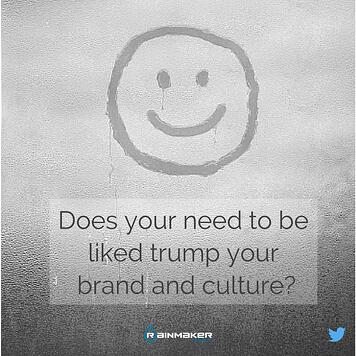What do you care about most?
Which comes first, the brand and culture of your company or your people?
Do not think about it.
Just answer the question.
There can only be one focus.
Is your need to be liked killing your brand and culture?
In a recent New Yorker profile of Jony Ive, The Shape of Things To Come, Apple's chief designer shared how he once asked Steve Jobs to tone it down after seeing his colleagues feel crushed.
Jobs did not agree.
"Why would you be vague?" Jobs asked Ive. "You don’t care about how they feel! You’re being vain, you want them to like you.”
Eventually Ive came to agree with Jobs' argument that managers must always provide clear, unambiguous feedback. Managers should not care whether their employees like them. To even consider the need to be liked is a form of vanity.
I am not naive to the fact that every human being has the need to be liked by others on some level. Unfortunately, businesses often fail when the need to be liked trumps the need to protect the brand and culture.
Are you making the right sales hiring and firing decisions based upon getting results or being liked?
You are not fooling anyone.
What do you do when a sales team member does not perform to their potential, or fails to meet the standards of the brand, culture and team? Do you push your low performers to climb? Do you push low performers out if they continue to fall short?
Or do you make a lame excuse and do nothing? You are not fooling anyone, particularly your high performers.
When a salesperson is not working out, they must be engaged and moved out if necessary AND QUICKLY . It is critical that you uphold the standards of your brand, culture, and sales team, no matter how ugly or uncomfortable terminating a low performer feels. When you delay action and make excuses for low performers, you are destroying your own credibility and trust.

You must passionately defend your brand, culture, AND your people.
Employee engagement does not begin by being nice to employees. Employee engagement does not occur by putting ping pong tables in the halls and allowing pets.
Employee engagement begins by hiring the right person in the first place, by having like-minded people fighting for the same cause.
Employee engagement begins when everyone defends the standards of the team and company, beginning with the company's leadership.
Truth and purity.
When I think back to the best times in my career, it is when I worked for those and with those who passionately believed in what we were doing at the time. We all rowed like hell in the same direction. We did what had to be done. Accountability was high. There was no posing. No smoke and mirrors. No vanity. There was just brand and culture, truth and purity of alignment.
Four strategies I recommend you implement immediately:
- Hire right in the first place using a job benchmark and a valid sales personality test.
- When you smell something is wrong, something is wrong! Stop everything and pay immediate attention!
- When a team member comes forward and says, "Seriously?" or "I think you need to be aware of..." pay immediate attention.
- Resolve the problem quickly and with as much dignity as possible.
Stop being vain.
Let's return to our initial inquiry: Which comes first, the brand and culture of your company or your people? When you vigorously shape and defend your brand and culture, your people ARE your culture and brand. Your brand, culture, and people become one.
When you get crystal clear about your brand and culture, the right salespeople will want in and they will stay; they will love your brand and culture as much as you do and everyone will row in the same direction.
But first, you must stop being vain.



